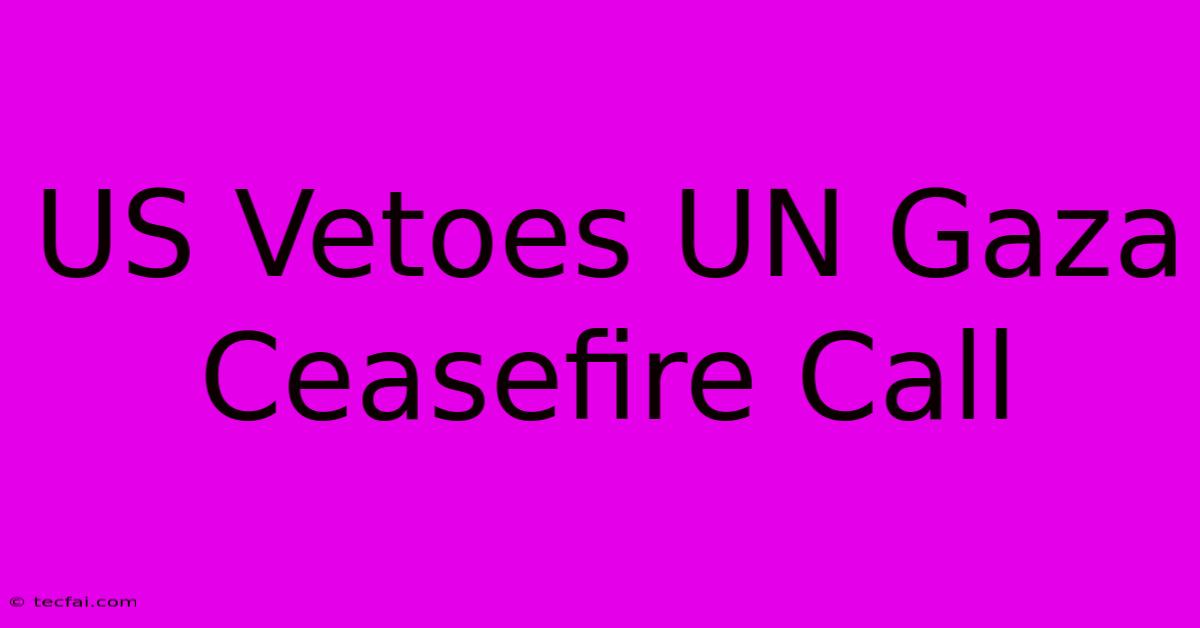US Vetoes UN Gaza Ceasefire Call

Discover more detailed and exciting information on our website. Click the link below to start your adventure: Visit Best Website tecfai.com. Don't miss out!
Table of Contents
US Vetoes UN Gaza Ceasefire Call: A Deep Dive into the International Response
The United States' veto of a UN Security Council resolution calling for a ceasefire in Gaza has sparked widespread international condemnation and reignited a fierce debate over the ongoing Israeli-Palestinian conflict. This action, occurring amidst a devastating escalation of violence, has significantly impacted the global perception of the US role in the region and the prospects for peace. This article delves into the details of the veto, the international reaction, and the wider implications for the conflict.
Understanding the UN Resolution and the US Veto
The proposed UN resolution, drafted by the United Arab Emirates, called for an immediate ceasefire between Israel and Hamas. It urged both sides to de-escalate the conflict and protect civilians. While the resolution didn't explicitly condemn either side, its focus on a ceasefire was seen as a crucial step towards ending the bloodshed. The US, however, exercised its veto power, preventing the resolution from passing.
The US justification for the veto centered on the claim that the resolution was “unbalanced.” Specifically, the US argued that the resolution failed to adequately address Hamas’s role in initiating the conflict and its continued attacks on Israeli civilians. This argument has been met with criticism, with many arguing that a ceasefire resolution is not the appropriate forum for assigning blame and that prioritizing a cessation of hostilities is paramount during a humanitarian crisis. The US also highlighted its ongoing efforts to secure a durable ceasefire through bilateral diplomatic channels.
The Impact of the Veto on International Relations
The US veto has significantly strained its relationships with many key international allies. Countries across the globe, including numerous European nations and many Arab states, strongly criticized the decision. They argued that the veto undermines the UN's role in maintaining international peace and security and sends the wrong message at a time when urgent action is needed. This action has further fueled perceptions of a growing disconnect between the US and the international community on issues concerning the Israeli-Palestinian conflict.
Analysis: The Broader Context and Implications
The US veto needs to be understood within the wider context of the ongoing Israeli-Palestinian conflict and the complex geopolitical dynamics of the region. The conflict's long history, marked by cycles of violence and stalled peace processes, shapes the current crisis. Furthermore, the internal political dynamics within both Israel and the US, as well as the influence of regional power players, play crucial roles in influencing policy decisions and responses.
Humanitarian Crisis and Civilian Casualties
The humanitarian situation in Gaza is dire. The conflict has resulted in a significant number of civilian casualties, widespread destruction of infrastructure, and a severe shortage of essential supplies. The US veto has been criticized for hindering international efforts to provide humanitarian assistance and address the urgent needs of the civilian population. Many international organizations have expressed serious concerns about the escalating humanitarian crisis and the impact of the ongoing violence on vulnerable populations.
The Path Forward: Negotiations and Diplomacy
Despite the setback caused by the US veto, efforts to achieve a ceasefire continue. International diplomatic initiatives, including those spearheaded by the UN and various individual nations, remain underway. The focus is on encouraging direct negotiations between the involved parties and facilitating the delivery of humanitarian aid. However, the path to a lasting peace remains challenging and fraught with obstacles. The lack of trust between the parties and the complex geopolitical landscape continue to pose significant hurdles.
Conclusion: A Critical Turning Point?
The US veto of the UN Gaza ceasefire resolution marks a significant turning point in the international response to the escalating conflict. It raises serious questions about the effectiveness of multilateral diplomacy and the role of the UN Security Council in addressing critical humanitarian crises. While the US emphasizes its commitment to securing a ceasefire through bilateral channels, the veto has undoubtedly damaged its international standing and undermined its credibility as a mediator in the Israeli-Palestinian conflict. The long-term consequences of this decision remain to be seen, but it undoubtedly casts a long shadow over the prospects for peace and stability in the region. The international community must continue to exert pressure on all parties to prioritize a lasting ceasefire and address the root causes of the conflict through meaningful dialogue and negotiation.

Thank you for visiting our website wich cover about US Vetoes UN Gaza Ceasefire Call. We hope the information provided has been useful to you. Feel free to contact us if you have any questions or need further assistance. See you next time and dont miss to bookmark.
Featured Posts
-
Influenza Risks Beyond A Simple Cold
Nov 26, 2024
-
Ucl Matchday 5 Likely Starting Xis
Nov 26, 2024
-
Week 12 Mnf Anytime Touchdown Odds
Nov 26, 2024
-
West Hams Coufal Faces Competition
Nov 26, 2024
-
Lithuania Fatal Dhl Cargo Plane Crash
Nov 26, 2024
